Lydia Clemmons: Keeping her family’s farm alive and vibrant
Lydia Clemmons believes she was the last of her five siblings anyone would have expected to take over the role of running her parents’ farm.
Of the five, she was the only one who lived far away, having left town for college and then moved to Africa, only returning to Charlotte for brief vacations. Nevertheless, she is the one who serves as president and executive director of the non-profit Clemmons Family Farm.

After 35 years in Africa, Lydia Clemmons has come home to her family’s farm.
Clemmons was initially set to follow in the footsteps of her parents — a doctor and a nurse — but in the early 1980s she left her pre-med program at Stanford University to join the Peace Corps. That trip sparked a 35-year career of working in Africa as an applied medical anthropologist. Clemmons thoroughly enjoyed her life in Africa but when her parents asked her to return to the family farm in Charlotte in 2013, she decided it was time to come home.
Clemmons has a master’s in public health from the University of Michigan and a PhD in medical anthropology from the University of Pennsylvania. Most of her work has been in the fields of public health, nutrition and agriculture.
Although the programs she shepherded were mostly in rural areas, they were often national or even multi-national in scope. One example was a World Health Organization program based in Burkina Faso to help treat river blindness. The goal was to get thousands of people to take a pill annually, but many were skeptical of the medicine. “You have to understand what the community perceives as well as your own cultural perceptions,” she said.
Another large project involved trying to improve the nutritional practices of farmers in Tanzania who were struggling to put food on the table. Clemmons’ area of expertise is social and behavior change communications and she used those techniques to find strategies to improve the eating habits of the farmers. She described the techniques as a more ethical version of those used in marketing and advertising.
“I was having a wonderful life in Africa,” Clemmons said, “but coming home was also a way for my son to have a sense of grounding in Vermont.”
Upon her return, Clemmons threw herself into the preservation of the family farm which became a non-profit organization in 2019. She was delighted to find a new community of African immigrants in her home state, a change from the more homogenous population she recalled.
The Clemmons Family Farm is now a hub of art and culture and Clemmons said some of that is a by-product of her time in Africa. She noted that a lot of her work in social and behavior change communication was done through the arts. Some of the rural communities in which she worked have low literacy rates, so information is sometimes conveyed via proverbs, spoken word, song, theater and visual arts.
The truth is that art and culture were always part of her family’s activities. After visiting Clemmons in Africa, her mother (also named Lydia) opened Authentica African Imports to bring African art to Vermont. Clemmons’ mother also got together with friends to cook African food for dinners to raise money for the Flynn during the 1980s.
Despite her new role at the farm, Clemmons never stopped working in Africa. Initially, she stayed in Charlotte and travelled at least once every quarter to Africa, visiting both the rural sections and the seats of power in the larger cities. When she first moved back, she estimates that she worked a regular 40-hour week for her full-time job plus 60 hours at the farm. The pandemic means that all her African work is now done remotely and is down to 25 to 30 hours a week, but her farm hours haven’t changed.
Since returning to the farm, Clemmons has won a number of awards including the Con Hogan Award from the Vermont Community Foundation and the Arthur Williams Award for Meritorious Service to the Arts from the Vermont Arts Council, and under her stewardship, the farm has received a number of other accolades. Awards, however, are not what motivate her, and she would be perfectly happy to stay behind the scenes.
Clemmons’ mother had a number of miscarriages and her pregnancy with her namesake daughter might have ended the same way if friends had not intervened and put her on mandatory bedrest.
“My mother always said she knew I had a special purpose,” Clemmons said. “I feel that coming back and saving the farm is that purpose. It’s immensely gratifying.”

